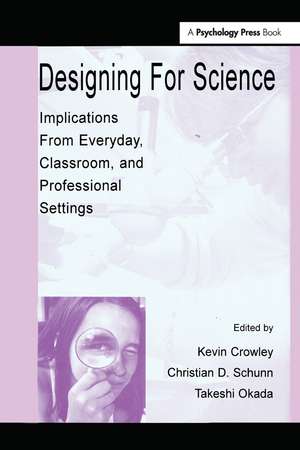Designing for Science: Implications From Everyday, Classroom, and Professional Settings
Editat de Kevin Crowley, Christian D. Schunn, Takeshi Okadaen Limba Engleză Hardback – mar 2001
* situations from young children visiting museums,
* middle-school students collaborating in classrooms,
* undergraduates learning about research methods, and
* professional scientists engaged in cutting-edge research.
A diverse set of approaches are represented, including sociocultural description of situated cognition, cognitive enthnography, educational design experiments, laboratory studies, and artificial intelligence. This unique mix of work from the three contexts deepens our understanding of each subfield while at the same time broadening our understanding of how each subfield articulates with broader issues of scientific thinking. To provide a common focus for exploring connections between everyday, instructional, and professional scientific thinking, the book uses a "practical implications" subtheme. In particular, each chapter has direct implications for the design of learning environments to facilitate scientific thinking.
Preț: 417.27 lei
Nou
Puncte Express: 626
Preț estimativ în valută:
79.87€ • 86.79$ • 67.13£
79.87€ • 86.79$ • 67.13£
Carte tipărită la comandă
Livrare economică 21 aprilie-05 mai
Preluare comenzi: 021 569.72.76
Specificații
ISBN-13: 9780805834734
ISBN-10: 0805834737
Pagini: 512
Dimensiuni: 152 x 229 x 38 mm
Greutate: 1.11 kg
Ediția:New.
Editura: Taylor & Francis
Colecția Psychology Press
Locul publicării:Oxford, United Kingdom
ISBN-10: 0805834737
Pagini: 512
Dimensiuni: 152 x 229 x 38 mm
Greutate: 1.11 kg
Ediția:New.
Editura: Taylor & Francis
Colecția Psychology Press
Locul publicării:Oxford, United Kingdom
Public țintă
ProfessionalCuprins
Contents: Preface. Part I: Fundamentals of Science Thinking. H.A. Simon, "Seek and Ye Shall Find": How Curiosity Engenders Discovery. M.A. Callanan, J.L. Jipson, Explanatory Conversations and Young Children's Developing Scientific Literacy. M. Azmitia, K. Crowley, The Rhythms of Scientific Thinking: A Study of Collaboration in an Earthquake Microworld. C. Schunn, J. Anderson, Acquiring Expertise in Science: Explorations of What, When, and How. K. Dunbar, What Scientific Thinking Reveals About the Nature of Cognition. R. Tweney, Scientific Thinking: A Cognitive-Historical Approach. Part II: Building for Scientific Thinking. D.E. Penner, Complexity, Emergence, and Synthetic Models in Science Education. D. Klahr, Z. Chen, E. Toth, From Cognition to Instruction to Cognition: A Case Study in Elementary School Science Instruction. R. Lehrer, L. Schauble, A. Petrosino, Reconsidering the Role of Experiment in Science Education. B. Loh, B.J. Reiser, J. Radinsky, D.C. Edelson, L.M. Gomez, S. Marshall, Developing Reflective Inquiry Practices: A Case Study of Software, Teacher, and Students. J. Shrager, High Throughput Discovery: Search and Interpretation on the Path to New Drugs. Part III: Evaluating Scientific Thinking. C.A. Chinn, B.A. Malhotra, Epistemologically Authentic Scientific Reasoning. K. Crowley, J. Galco, Everyday Activity and the Development of Scientific Thinking. J. Minstrell, Facets of Students' Thinking: Designing to Cross the Gap From Research to Standards-Based Practice. T. Okada, T. Shimokido, The Role of Hypothesis Formation in Psychological Research. P. Thagard, Internet Epistemology: Contributions of New Information Technologies to Scientific Research.
Recenzii
"...this book offers a rewarding look at research on scientific thinking appropriate for graduate students, researchers, and faculty primarily in the areas of science education and history/philosophy of science. A good resource for all research university libraries."
—CHOICE
—CHOICE
Notă biografică
Kevin Crowley, Christian D. Schunn, Takeshi Okada
Descriere
This vol is crafted around the design cycle as it relates to research on everyday, classrm, & professnl science. Individual chs & bk as a whole will appeal to educators, cognitive scientsts, & those who study the process of scientific thinking in practic
